THE KING YOU LOVE TO HATE
Critics have thrown stones at The Life and Death of King John for centuries, but New York Shakespeare Exchange delivers such a clear, astute, and enjoyable production of the play that one must wonder what is wrong with all those literary pundits. Far from a muddled mess, the play is a deftly-plotted political thriller in which a scheming Cardinal coolly plays two branches of a royal family like pawns as they all vie for the crown of England. Criticism of the play often centers on the lack of heroism in King John, 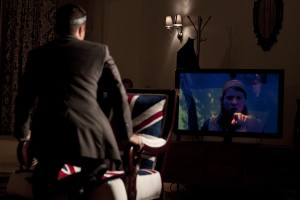 the king everyone loves to hate (he’s the bad guy in the Robin Hood stories), and the attention drawn by the supporting character of the Bastard (more about him later). Perhaps they are looking for valor in all the wrong places – and in all the wrong sexes. The play presents two compelling and formidable women, each claiming the crown for her son, and a conflicted princess who cries for peace in defiance of her entire family. “Women and fools, break off your conference,” demands Lewis, the Dauphin of France. Perhaps what perplexes literary critics is that the women and fools are at the heart of this play, not the kings and princes.
the king everyone loves to hate (he’s the bad guy in the Robin Hood stories), and the attention drawn by the supporting character of the Bastard (more about him later). Perhaps they are looking for valor in all the wrong places – and in all the wrong sexes. The play presents two compelling and formidable women, each claiming the crown for her son, and a conflicted princess who cries for peace in defiance of her entire family. “Women and fools, break off your conference,” demands Lewis, the Dauphin of France. Perhaps what perplexes literary critics is that the women and fools are at the heart of this play, not the kings and princes.
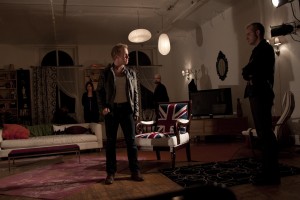 The Life and Death of King John recounts the acrimonious power struggle within the Plantagenet family at the end of the 12th century. Richard the Lionhearted is dead, and his mother, Queen Eleanor, has seen to it that the kingdom passes to her fifth and youngest son, who is crowned King John. Meanwhile, Constance, the widow of King John’s older brother Geoffrey, thinks that her son Arthur (JC Vasquez) should be king. She aligns herself with King Philip of France (Chris Thorn), who would like to acquire a piece of England for himself. Thus the stage is set for war between England and France.
The Life and Death of King John recounts the acrimonious power struggle within the Plantagenet family at the end of the 12th century. Richard the Lionhearted is dead, and his mother, Queen Eleanor, has seen to it that the kingdom passes to her fifth and youngest son, who is crowned King John. Meanwhile, Constance, the widow of King John’s older brother Geoffrey, thinks that her son Arthur (JC Vasquez) should be king. She aligns herself with King Philip of France (Chris Thorn), who would like to acquire a piece of England for himself. Thus the stage is set for war between England and France.
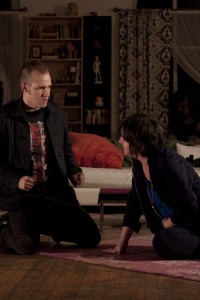 Well, metaphorically at least. Director Ross Williams’ modern interpretation places the action entirely in the living room of a penthouse loft, an interesting choice that brings to mind dramas about backstabbing rich families, like Luchino Visconti’s The Damned, or maybe even Dallas or Falcon Crest. Indeed, the battle scenes take the infighting literally, with family members jumping on sofas and attacking one another with cocktail mixers and spray bottles. The simplicity of the production gives prominence to the text, which is delivered with clarity and depth by the uniformly strong cast.
Well, metaphorically at least. Director Ross Williams’ modern interpretation places the action entirely in the living room of a penthouse loft, an interesting choice that brings to mind dramas about backstabbing rich families, like Luchino Visconti’s The Damned, or maybe even Dallas or Falcon Crest. Indeed, the battle scenes take the infighting literally, with family members jumping on sofas and attacking one another with cocktail mixers and spray bottles. The simplicity of the production gives prominence to the text, which is delivered with clarity and depth by the uniformly strong cast.
In particular, the fierce women who are the engines of the action in the first act are both complex and formidable. 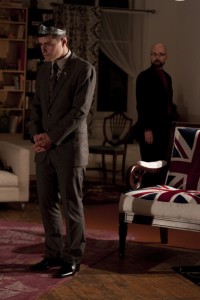 Carmen Meyers is a stately matriarchal figure as Queen Eleanor, the guiding force and chief counselor to her son, wonderfully played by Vince Gatton as a pampered, nail-biting, trust fund brat who later becomes increasingly unhinged after the unanticipated death of his mother. Going toe-to-toe against Eleanor, Leigh Williams is a turbulent force as Constance, goading France to war in an obsessive determination to put her young son Arthur on the throne, even as he pleads, “Good, my mother, peace! I would that I were low laid in my grave: I am not worth this coil that’s made for me.”
Carmen Meyers is a stately matriarchal figure as Queen Eleanor, the guiding force and chief counselor to her son, wonderfully played by Vince Gatton as a pampered, nail-biting, trust fund brat who later becomes increasingly unhinged after the unanticipated death of his mother. Going toe-to-toe against Eleanor, Leigh Williams is a turbulent force as Constance, goading France to war in an obsessive determination to put her young son Arthur on the throne, even as he pleads, “Good, my mother, peace! I would that I were low laid in my grave: I am not worth this coil that’s made for me.”
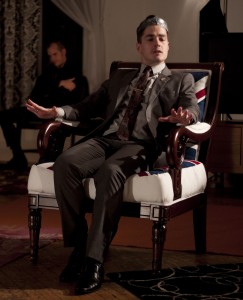 Constance’s ambition is derailed when Hubert de Burgh (a sympathetic Christopher Michael McFarland) brokers a precarious peace between France and England through the marriage of King Philip’s son, Lewis the Dauphin (Joshua Jeffers), and Lady Blanche (Katelin Wilcox), the daughter of King John’s younger sister. With this wedding, it seems that a peaceful resolution is at hand, and King John even magnanimously offers Arthur a few kingdoms. Everyone is relieved, except for Constance, who still wants it all. “War! War!” she cries, “No peace! Peace is to me a war!”
Constance’s ambition is derailed when Hubert de Burgh (a sympathetic Christopher Michael McFarland) brokers a precarious peace between France and England through the marriage of King Philip’s son, Lewis the Dauphin (Joshua Jeffers), and Lady Blanche (Katelin Wilcox), the daughter of King John’s younger sister. With this wedding, it seems that a peaceful resolution is at hand, and King John even magnanimously offers Arthur a few kingdoms. Everyone is relieved, except for Constance, who still wants it all. “War! War!” she cries, “No peace! Peace is to me a war!”
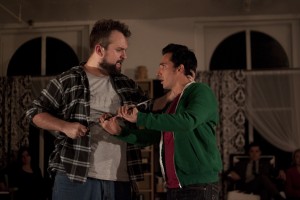 Constance gets her wish. King John has overstepped his authority by choosing a noble to be Archbishop of Canterbury rather than the Pope’s appointee, and the Pope sends the scheming Cardinal Pandulph to interrupt the happy nuptials. In a speech that probably elicited applause when it was first performed, John comes out in defiance against the Catholic Church. “No Italian priest shall tithe or toll in our dominions,” he declares, “Where we do reign, we will alone uphold.” Phillip is aghast at this blasphemy and suddenly finds himself torn between alliance with England and loyalty to the Catholic Church. With Constance harping on his betrayal, the Cardinal’s threats of excommunication, and his son warning him that there would be civil war in France if he renounces the Church, Philip crumbles and reluctantly breaks with England.
Constance gets her wish. King John has overstepped his authority by choosing a noble to be Archbishop of Canterbury rather than the Pope’s appointee, and the Pope sends the scheming Cardinal Pandulph to interrupt the happy nuptials. In a speech that probably elicited applause when it was first performed, John comes out in defiance against the Catholic Church. “No Italian priest shall tithe or toll in our dominions,” he declares, “Where we do reign, we will alone uphold.” Phillip is aghast at this blasphemy and suddenly finds himself torn between alliance with England and loyalty to the Catholic Church. With Constance harping on his betrayal, the Cardinal’s threats of excommunication, and his son warning him that there would be civil war in France if he renounces the Church, Philip crumbles and reluctantly breaks with England.
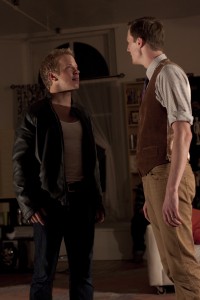 This tense and eloquent scene is just one of many in which Shakespeare homes in on some of the most pressing issues of his day with dazzling political acumen. The conflict between the Catholic and Anglican Church in Elizabethan England is mirrored in the struggle between King John and the wily Cardinal Pandulph, played with quiet creepiness by Kevin Brewer, who coolly checkmates the royalty into submission to the Church. The problems of dynastic succession, reflected in the dispute between King John and Arthur, echo the conflict between Elizabeth and her cousin Mary, Queen of Scots, who was executed just a few years before the play was written. Shakespeare also inserts a fictional character in the play who calls attention to questions of inheritance and legitimacy, Phillip of Faulconbridge (Chris Bresky), a bastard son of Richard the Lionhearted. The first of Shakespeare’s famous bastards (preceding Don John in Much Ado About Nothing and Edmund in King Lear), he is a salty, down-to-earth, loyal English Everyman, as well as a comic relief, provocateur, and cynical commentator who rises to lead the English army, but is not above exulting, “This is worshipful society, and fits the mounting spirit like myself.”
This tense and eloquent scene is just one of many in which Shakespeare homes in on some of the most pressing issues of his day with dazzling political acumen. The conflict between the Catholic and Anglican Church in Elizabethan England is mirrored in the struggle between King John and the wily Cardinal Pandulph, played with quiet creepiness by Kevin Brewer, who coolly checkmates the royalty into submission to the Church. The problems of dynastic succession, reflected in the dispute between King John and Arthur, echo the conflict between Elizabeth and her cousin Mary, Queen of Scots, who was executed just a few years before the play was written. Shakespeare also inserts a fictional character in the play who calls attention to questions of inheritance and legitimacy, Phillip of Faulconbridge (Chris Bresky), a bastard son of Richard the Lionhearted. The first of Shakespeare’s famous bastards (preceding Don John in Much Ado About Nothing and Edmund in King Lear), he is a salty, down-to-earth, loyal English Everyman, as well as a comic relief, provocateur, and cynical commentator who rises to lead the English army, but is not above exulting, “This is worshipful society, and fits the mounting spirit like myself.”
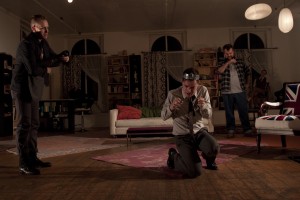 In contrast to the Bastard and the warmongering ambitiousness of all the other characters of the play, Lady Blanche and the young Arthur emerge as strikingly modern voices for peace. Submitting to marriage with the French prince to attain peace within her family, Lady Blanche passionately rails against continued hostilities, beseeching her new husband, “Upon my knee I beg, go not to arms against mine uncle.” Arthur is a much gentler figure, an ideal young prince who epitomizes purity and innocence. Like Henry VI in Shakespeare’s earliest historical play, he is reluctantly caught in the crossfire of war, and wistfully declares, “So I were out of prison and kept sheep, I should be merry as the day is long.” His capture and unexpected death sets off a calamitous chain of events that ultimately results in King John’s death and the consolidation of the power of the Catholic Church. King John belatedly realizes, “There is no sure foundation set on blood, No certain life achieved by others’ death.”
In contrast to the Bastard and the warmongering ambitiousness of all the other characters of the play, Lady Blanche and the young Arthur emerge as strikingly modern voices for peace. Submitting to marriage with the French prince to attain peace within her family, Lady Blanche passionately rails against continued hostilities, beseeching her new husband, “Upon my knee I beg, go not to arms against mine uncle.” Arthur is a much gentler figure, an ideal young prince who epitomizes purity and innocence. Like Henry VI in Shakespeare’s earliest historical play, he is reluctantly caught in the crossfire of war, and wistfully declares, “So I were out of prison and kept sheep, I should be merry as the day is long.” His capture and unexpected death sets off a calamitous chain of events that ultimately results in King John’s death and the consolidation of the power of the Catholic Church. King John belatedly realizes, “There is no sure foundation set on blood, No certain life achieved by others’ death.”
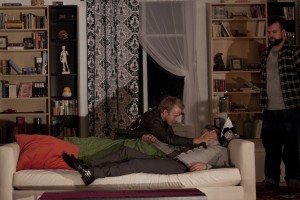 Arthur’s death is mistakenly attributed to King John, whereupon England erupts in riots against the king. In this contemporary staging of the play, the burning and looting of London streets are glimpsed on a television news program that seems ripped from recent headlines. The use of television programs and cell phones is not always as successful. The business in the beginning with family members jockeying for the remote control is particularly awkward. It’s also a little jarring that everything is modernized except for the obsolete notion of monarchy. The cast looked a bit uncomfortable kneeling before the king in modern dress (especially the women in knee-high dresses) and it was a little hard to believe that these upper-crust Park Avenue types were fighting for a kingdom instead of, say, a piece of the family corporation or a chunk of the family estate – but this is quibbling. The Life and Death of King John is an assured production of a play that deserves to be reevaluated. New York Shakespeare Exchange scores an impressive debut in their brisk and jaunty production of Shakespeare’s much maligned tragedy of succession.
Arthur’s death is mistakenly attributed to King John, whereupon England erupts in riots against the king. In this contemporary staging of the play, the burning and looting of London streets are glimpsed on a television news program that seems ripped from recent headlines. The use of television programs and cell phones is not always as successful. The business in the beginning with family members jockeying for the remote control is particularly awkward. It’s also a little jarring that everything is modernized except for the obsolete notion of monarchy. The cast looked a bit uncomfortable kneeling before the king in modern dress (especially the women in knee-high dresses) and it was a little hard to believe that these upper-crust Park Avenue types were fighting for a kingdom instead of, say, a piece of the family corporation or a chunk of the family estate – but this is quibbling. The Life and Death of King John is an assured production of a play that deserves to be reevaluated. New York Shakespeare Exchange scores an impressive debut in their brisk and jaunty production of Shakespeare’s much maligned tragedy of succession.
victorialinchong @ stageandcinema.com
photos by Daniel Winters
The Life and Death of King John
Access Theater
scheduled to end on October 2
for tickets, visit http://www.ShakespeareExchange.org
